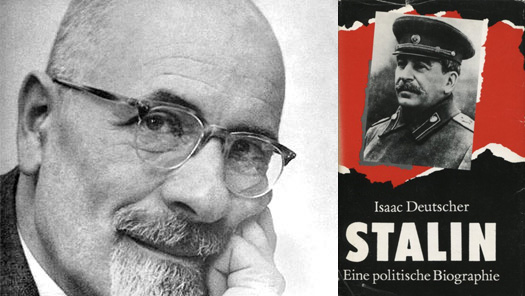He is known for his works on Soviet society and its leaders: Who is Isaac Deutscher?
According to him, by embracing the idea of "socialism in one country", Stalin prevented socialist revolutions that could take place all over the world.

(1907-1967) British historian of Polish origin. He is known for his studies on Soviet society and its leaders. He was born on April 3, 1907, in Chrzanow, and died on August 20, 1967, in Rome. He worked as a newspaper and literary critic in the Polish press between 1924 and 1939. He joined the Polish Communist Party in 1926. He was expelled from the party in 1932 because he opposed Stalin's views. Deutscher, who went to London in 1939 and became a British citizen, wrote articles in The Economist magazine there. His articles were published in The Observer newspaper between 1942 and 1947. He later focused on historical research. He taught at Cambridge University in 1966-1967.
According to Deutscher, the 1917 October Revolution brought to the fore the problems that could be encountered in the realization of socialism in an underdeveloped country. According to him, in 1917, production had not yet acquired a social character, which was one of the prerequisites for the development of socialism in Russia. Agricultural lands were fragmented into small holdings numbering millions. The state and industry were very weak. The working class was physically and politically worn out during the Civil War. Workers led by the Bolsheviks had expropriated the capitalists, but they had difficulty in establishing a socialist economy and way of life. According to Deutscher, these conditions led to the bureaucratization of the regime over time.
Isaac Deutscher (3 April 1907 – 19 August 1967) was a Polish Marxist writer, journalist and political activist who moved to the United Kingdom before the outbreak of World War II. He is best known as a biographer of Leon Trotsky and Joseph Stalin and as a commentator on Soviet affairs. His three-volume biography of Trotsky was highly influential among the British New Left in the 1960s and 1970s.
According to Deutscher, the real Soviet democracy advocated by Lenin and Trotsky required a working class that was alert and determined to defend its rights, able to oppose a new bureaucracy that could use power for its interests. Lenin was aware of the danger of bureaucratization but was sometimes helpless in the face of negative conditions. Initially, members of the Bolshevik Party were granted freedom of expression and political initiative, but in the process, as the various groups that emerged were suppressed, power passed into the hands of a minority. As the representative of this minority, Stalin created an authoritarian party and state structure under his rule.
According to Deutscher, the Bolsheviks considered the realization of socialism not only as a phenomenon specific to Russia, but also as an international process, and saw the October Revolution as the beginning of socialist revolutions in Europe. However, as the USSR was pushed into isolation in international relations in the 1920s, Stalin's view of "socialism in one country" gained weight. Isaac Deutscher accused Stalin of turning a historical necessity into a virtue and rejecting the concept of world revolution.
According to him, this approach means arguing that Russia alone can establish a classless society, believing that the possibility of socialist revolution in Western countries has disappeared, and is based on the desire to protect the social position of the "soviet bureaucracy". For this reason, Stalin turned the Comintern into a tool of his diplomacy and tried to ensure the security of the USSR.
According to Deutscher, Khrushchev's statements about the Stalin period made at the 20th Congress of the CPSU were limited, and many facts about the previous period could not escape uncertainty.
Isaac Deutscher advised the Soviet society that if it did not want to remain just an object of history, it should transform the state apparatus, which until now had been above and beyond itself, into a structure that truly represented its interests.
Works of Isaac Deutscher:
Stalin, (1969);
The Prophet Armed, 1954,
The Prophet Unarmed 1959,
The Prophet Outcast, 1963,
The Unfinished Revolution, Russia
1917-1967, 1967.
